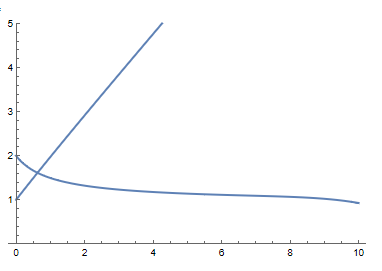I try to solve this couple of second order differential equations to get an analytic solution for x(t) and y(t)
(x'[t]/x[t]) (y'[t]/3*y[t]) + y''[t]/3*y[t] + 2 x''[t]/x[t] =0
2*(x'[t]/x[t]) y'[t] + y''[t] = 0
I'm a beginner in MA. However I think DSolve can not solve these coupled ODE in one step, here is my trial :
eq1[t_] := x'[t]/x[t] * y'[t]/(3 y[t]) + y''[t]/(3 y[t]) + 2 *x''[t]/x[t]
eq2[t_] := 2 x'[t] /x[t] y'[t] + y''[t]
DSolve[{eq1[t] == eq2[t] == 0, x[0] == 0, y[0] == 0}, {x, y}, t]
Which gives no solution. Noting that the IC are arbitrary. So any help how to go around that, I mean can the function x given in terms of y from eq1, then substitute in eq2 which will be in this case a function of y only.


DSolvecan't solve it without IC, so most likely this is unsolvable. May be you made mistake in entering the ode's from the text book ?. It is very easy to make up ode's which can not be solved analytically. $\endgroup$